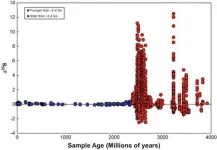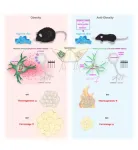(Press-News.org) A new blood test called p-tau217 shows promise as an Alzheimer's disease biomarker, and when used in a two-step workflow very high accuracy to either identify or exclude brain amyloidosis, the most important and earliest pathology. That is an innovation now presented by researchers at the University of Gothenburg, together with colleagues at University of Lund and in Montreal, Canada.
In recent years, a lot of effort has been put on developing biomarkers in blood that could potentially help to identify Alzheimer’s disease (AD). Tau protein, in particular its phosphorylated variant (p-tau) – and one of the main proteins involved in AD pathology – has been the focus of extensive research and developments the last years.
The new blood-based p-tau biomarkers, especially a variant called p-tau217, have shown great promise as clinically useful tools to screen patients with memory problems or other early cognitive symptoms suggestive of early Alzheimer’s disease.
However, even if promising, a concern has been that classifying early patients into either having “AD or not AD” will still result in a rather high percentage of false positives (individuals with a positive test result who do not have AD) and false negatives (individuals with a negative test result who prove to have AD based on other examinations such as amyloid PET scans).
Considering not only ethical and psychological concerns induced by possible misdiagnosis, but also high costs and potential medical risks of initiating treatments on people not having the target disease), the scientists at the University of Gothenburg and their colleagues developed a novel strategy for the clinical implementation of blood biomarkers.
Two-step workflow
The two-step model is built on a first step with a diagnostic model (based on plasma p-tau217 together with age and APOE e4) to stratify patients with mild cognitive impairment (MCI) for risk of amyloid PET positivity. Step 2 is based on confirmatory testing with CSF Ab42/40 ratio (or amyloid EPT) only in those with uncertain outcomes in step 1.
The workflow was evaluated in 348 MCI participants from the Swedish BioFINDER studies (Lund University) and validated in the independent TRIAD cohort (McGill University, Montreal, Canada) also using an independent method for analysis of plasma p-tau217.
Very high accuracy
The model was evaluated at three different thresholding strategies were explored to classify participants into groups with low, intermediate and high risk for being “Aβ positive” (having AD-type pathology). At the stringent lower probability thresholds with 97.5% sensitivity (to avoid missing detection of patients who are Aβ positive), as little as 6.6% false negatives was found, while the stringent 97.5% specificity (to avoid classifying patients who are Aβ negative as ‘high risk’) gave only 2.3% false positives.
At the stringent sensitivity/specificity thresholds, 41% of patients fell into the intermediate risk group (compared to 29% of patients for the 95% thresholds). Further evaluations of this group with CSF Aβ42/40 showed very good agreement (86%) with amyloid PET results. Results were verified in the independent McGill cohort of patients.
A clinically useful strategy for p-tau217 blood test for AD screening
The study presents a blood plasma p-tau217-based two-step model for risk stratification of patients with MCI into high, low- and intermediate-risk of having brain amyloidosis and early AD pathology. The blood test applied in step 1 shows very high accuracy to identify high-risk patients, who depending on the clinical situation can either be given a diagnosis and be initiated on symptomatic treatments, or in the future be referred to the specialist clinic for possible initiation disease-modifying treatment.
In the low-risk group, AD can be excluded with high degree of certainty. The intermediate risk group will only encompass around one third of patients, which substantially will reduce the need for confirmatory CSF or PET testing at the specialist clinic, and thus cost savings for the society.
The study is published in the journal Nature Aging.
END
New blood test gives very high accuracy to screen for Alzheimer’s disease
2023-08-31
ELSE PRESS RELEASES FROM THIS DATE:
Antioxidants stimulate blood flow in tumors
2023-08-31
Vitamin C and other antioxidants stimulate the formation of new blood vessels in lung cancer tumours, a new study from Karolinska Institutet published in The Journal of Clinical Investigation shows. The discovery corroborates the idea that dietary supplements containing antioxidants can accelerate tumour growth and metastasis.
“We’ve found that antioxidants activate a mechanism that causes cancer tumours to form new blood vessels, which is surprising, since it was previously thought that antioxidants have a protective effect,” says study leader Martin Bergö, professor at the ...
Talk therapy with other moms an effective treatment for postpartum depression, McMaster research shows
2023-08-31
HAMILTON, ON (Aug. 31, 2023) – An innovative model of care that offers new mothers psychotherapy delivered by other mothers who have also experienced post-partum depression (PPD) should be implemented in clinical practice, according to researchers at McMaster University.
Researchers worked with nearly 200 mothers over a year and a half, during the height of the COVID-19 pandemic, and found those receiving treatment from their peers were 11 times more likely to experience remission of their major depressive disorder. The findings of the randomized control trial are published in Acta Psychiatrica Scandinavica.
PPD and its associated symptoms affect ...
Single-dose psilocybin treatment for major depressive disorder
2023-08-31
About The Study: In a randomized clinical trial with 104 participants, psilocybin treatment was associated with a clinically significant sustained reduction in depressive symptoms and functional disability, without serious adverse events. These findings add to increasing evidence that psilocybin—when administered with psychological support—may hold promise as a novel intervention for major depressive disorder.
Authors: Charles L. Raison, M.D., of Usona Institute in Fitchburg, Wisconsin, is the corresponding author.
To access the embargoed study: Visit our For The Media website at ...
Deaths due to COVID-19 in patients with cancer during different waves of the pandemic in the US
2023-08-31
About The Study: The findings of this study suggest that patients with cancer had a disparate burden of COVID-19 mortality during the winter Omicron wave compared with the general U.S. population. With the emergence of new, immune-evasive SARS-CoV-2 variants, many of which are anticipated to be resistant to monoclonal antibody treatments, strategies to prevent COVID-19 transmission should remain a high priority.
Authors: Chi-Fu Jeffrey Yang, M.D., of Massachusetts General Hospital in Boston, is the corresponding ...
New research reveals Earth's ancient ‘breath’: Study reveals connection between atmospheric changes and mantle chemistry
2023-08-31
An international team of scientists have uncovered an important link between Earth’s early atmosphere and the chemistry of its deep mantle.
The study, which was led by researchers at the University of Portsmouth and University of Montpellier, sheds new light on the evolution of life on our planet and the rise of atmospheric oxygen.
The team investigated magmas formed in ancient subduction zones, where portions of Earth’s crust sink back into the mantle, from a pivotal moment in Earth's history – the Great Oxidation Event (GOE). This event, which is estimated to have happened between 2.1 ...
Discovery opens possibility of new ion channel-targeting drugs
2023-08-31
Ion channels are attractive drug targets due to their importance in health and disease, but finding ways to target a specific ion channel selectively is a major challenge. Now, researchers at Weill Cornell Medicine and RMIT University in Australia have discovered that ion channels called BK channels have unique openings in their sides, which drug molecules may be able to access. The finding, published Aug. 31 in Nature Chemical Biology, could lead to the development of selective drugs that target the BK channel to treat ...
Analog and digital: The best of both worlds in one energy-efficient system
2023-08-31
We live in an analog world of continuous information flow that is both processed and stored by our brains at the same time, but our devices process information digitally in the form of discrete binary code, breaking the information into little bits (or bites). Researchers at EPFL have revealed a pioneering technology that combines the potential of continuous analog processing with the precision of digital devices. By seamlessly integratingultra-thin, two-dimensional semiconductors with ferroelectric materials, the research, published in Nature Electronics, unveils a novel way to improve energy efficiency and add new functionalities in computing. The ...
Coastal fisheries show surprising resilience to marine heat waves
2023-08-31
Rutgers-led research found that marine heat waves – prolonged periods of unusually warm ocean temperatures – haven’t had a lasting effect on the fish communities that feed most of the world.
The finding is in stark contrast to the devastating effects seen on other marine ecosystems cataloged by scientists after similar periods of warming, including widespread coral bleaching and harmful algal blooms.
“There is an emerging sense that the oceans do have some resilience, and while they are changing in response ...
A new breakthrough in obesity research allows you to lose fat while eating all you want
2023-08-31
This is a significant development that brings hope to the one billion individuals with obesity worldwide. Researchers led by Director C. Justin LEE from the Center for Cognition and Sociality (CCS) within the Institute for Basic Science (IBS) have discovered new insights into the regulation of fat metabolism. The focus of their study lies within the star-shaped non-neuronal cells in the brain, known as 'astrocytes'. Furthermore, the group announced successful animal experiments using the newly developed drug 'KDS2010', which allowed the mice to successfully achieve weight loss without resorting ...
New blood test for noncoding RNA significantly improves cancer detection
2023-08-31
Cancer is most treatable in its early stages, so finding innovative and non-invasive methods to diagnose cancer early on is crucial for fighting the disease. Liquid biopsies, which require just a simple blood draw, are an emerging technology for non-invasively testing for cancer using DNA or RNA sequencing of a patient’s blood.
Assistant Professor of Biomolecular Engineering Daniel Kim and his lab are developing more accurate and powerful liquid biopsy technologies that take advantage of signals from RNA “dark matter,” an understudied ...





